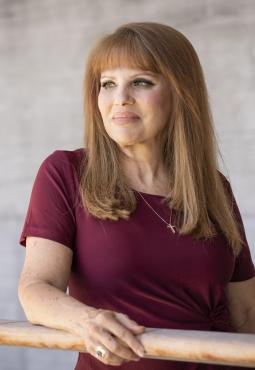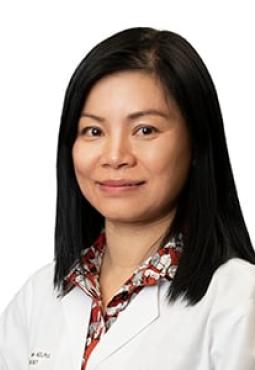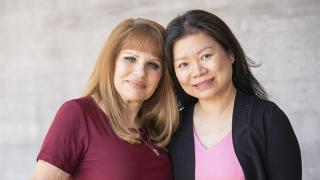Renee Bentson wasn’t accustomed to feeling tired. Or ill.
“I’ve always been a healthy person,” said the Covina, California, mother of five and gym enthusiast, 71. “I would run seven miles a day.”
By her own description, she’s also a stubborn person. So when she developed a rash, chest pain and night sweats a few years ago, she dismissed them all.

Then unusual fatigue set in and lumps began to appear, first on one side of her torso, then the other, and on one arm. A friend urged her to see a doctor, who promptly ordered a biopsy. Not long after, Bentson got the word: follicular lymphoma (FL), a form of non-Hodgkin’s lymphoma affecting the body’s B cells.
FL makes up about 20% of all lymphoma cases. It tends to strike older people, and although it does respond to treatment, it can be very hard to cure, with patients tending to relapse after periods of remission. FL usually grows slowly, but sometimes it can morph into the more dangerous, faster-growing diffuse large B cell lymphoma.
The disease usually becomes harder to treat each time a patient relapses, and early progression can be associated with poor long-term prognosis. It is estimated that, in the United States, approximately 13,000 new cases will be diagnosed in 2023, and more than 100,000 people are diagnosed with follicular lymphoma each year worldwide.
While some patients do well on chemotherapy, Bentson adamantly rejected that option. “I didn’t want chemo,” she said emphatically, concerned about side effects. Instead, she embarked on a series of immunotherapy clinical trials that provided only limited results; the cancer would shrink but not disappear, and later it would recur.
A Two-Pronged Attack
Most immunotherapy drugs are designed to target a specific protein on cancerous cells so that the immune system can recognize and attack them.
A newer option, CAR T cell therapy, modifies the immune system itself, re-engineering the patient’s T cells to turn them into cancer-fighting weapons.
But suppose there were a single treatment that did both?
Enter mosunetuzumab. And Elizabeth Budde, M.D., Ph.D.
“I’m a strong believer in the power of immunotherapy,” said Budde, associate professor in the Division of Lymphoma, Department of Hematology & Hematopoietic Cell Transplantation at City of Hope, “and I’m super excited about mosunetuzumab.”
Since 2014, Budde has led the investigation into the unique properties of mosunetuzumab and other “bispecific” monoclonal antibodies. Instead of concentrating on a single target, bispecific drugs act on two locations simultaneously.

In the case of mosunetuzumab, one arm targets the CD-3 protein on T cells, activating the cells; a second arm binds to CD-20, a protein commonly found on lymphoma cells. The two cell types are pulled together, with mosunetuzumab serving as a kind of bridge. Being in such close proximity allows the now-activated T cells to better recognize and attack the lymphoma cells. “Because the process for destroying the cancer cells is so targeted, the rest of the body is often spared the kind of side effects one might experience with chemotherapies,” Budde says.
In clinical trials, this “two-for-one” approach has succeeded beyond expectations.
“When we put our first patient on [mosunetuzumab],” recalled Budde, “after just one treatment, the patient’s circulating lymphoma cells virtually disappeared. We did not expect that. It was a pleasant surprise.”
Bentson was one of those early patients, receiving her first infusion in September 2016. By November, she was in complete remission. Almost seven years later, she still is. (Her remarkable story was recently featured on Spectrum News 1.)
She’s not alone. Among Budde’s FL patients who’ve gone through other therapies only to see their disease return (the toughest group to treat), a majority have achieved complete remission on mosunetuzumab. In December 2022, the Food and Drug Association granted mosunetuzumab accelerated approval for adult patients with relapsed or refractory FL. It is currently in clinical trials testing its use as an injection, earlier in the treatment process or in combination with other drugs to improve its efficacy.
For patients with FL, mosunetuzumab has now proven that it outperforms chemotherapy, according to Budde.
“With just pure immunotherapy, without any chemo at all, 80% of patients derived benefits, and 60% continued to remain in complete remission,” she said.
Breaking Through Limitations
For several years now, scientists looking for the next immunotherapy breakthrough have raved about the powerful potential of CAR T cell treatment for blood diseases and, down the road, possibly solid tumors as well. Mosunetuzumab appears to be following a similar path, but without several of CAR T’s inherent limitations.
CAR T treatment must be custom-made, derived from each individual patient’s T cells, a time-consuming and expensive process. Mosunetuzumab is “off the shelf,” saving time and money.
CAR T patients can experience intense and often dangerous side effects, especially cytokine release syndrome, when newly activated T cells send a flood of inflammatory cytokines into the system, triggering a variety of severe symptoms. So far, studies indicate much lower levels of such side effects with mosunetuzumab, partly because bispecific antibodies do not linger in the body the way CAR T cells can. This makes mosunetuzumab a better choice for older patients who can’t tolerate high toxicity. Indeed, several people in the clinical trials are in their 80s, and one is in his 90s.
For less at-risk patients, Budde believes she can leverage the power of both treatments by combining them, either starting with mosunetuzumab to activate T cells, which would enhance the CAR T treatment to follow, or administering mosunetuzumab immediately after a CAR T infusion for faster results. “Using them both may make each of them better,” she believes.
Beyond lymphoma, Budde also sees possibilities for bispecific agents in the treatment of prostate and colon cancers.
It’s one more example of the envelope-pushing mentality that permeates City of Hope’s campus, a fact not lost on patients.
“City of Hope lives up to its name,” said Bentson, adding that “it’s always so important to go to a place that’s doing research, a place that’s at the cutting edge of what’s out there.”
Main photo: Bentson recently reunited with her oncologist Elizabeth Budde, M.D., Ph.D., at City of Hope in Los Angeles.
